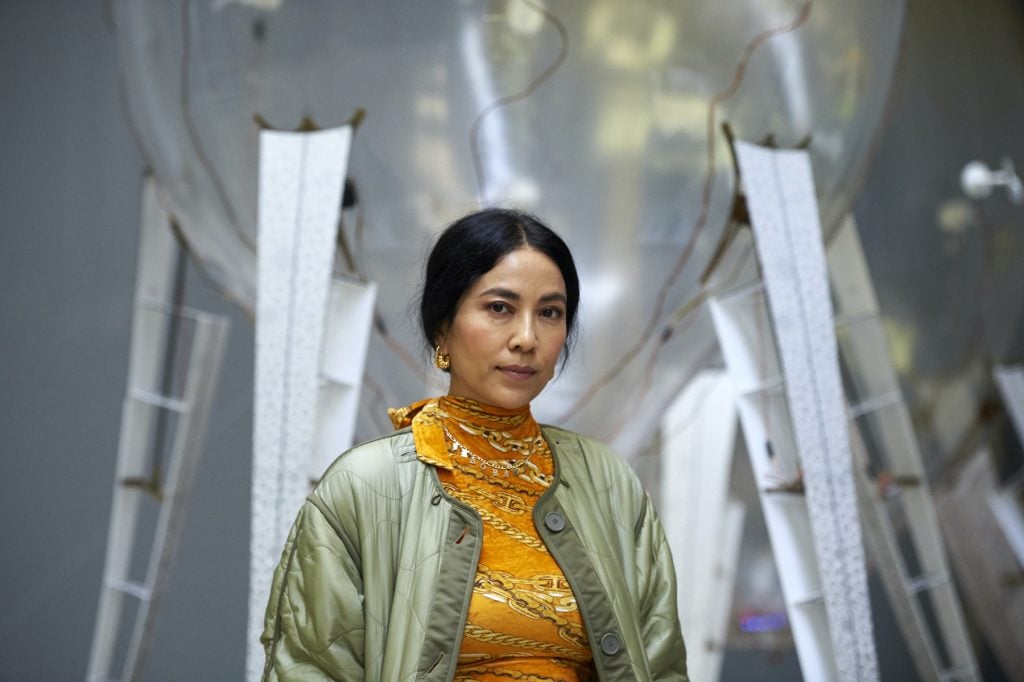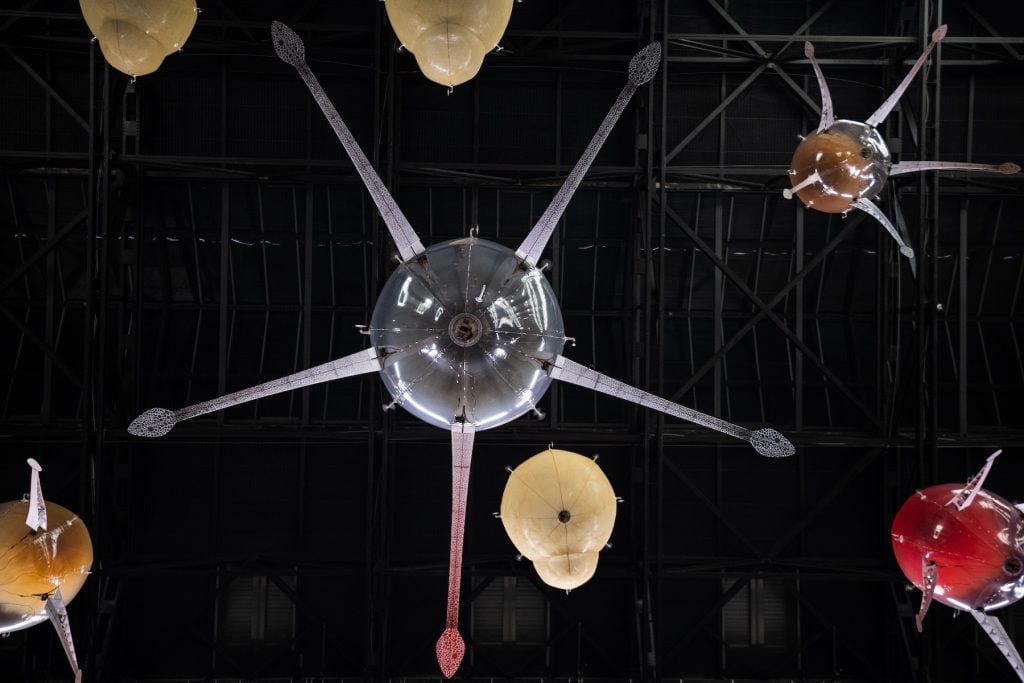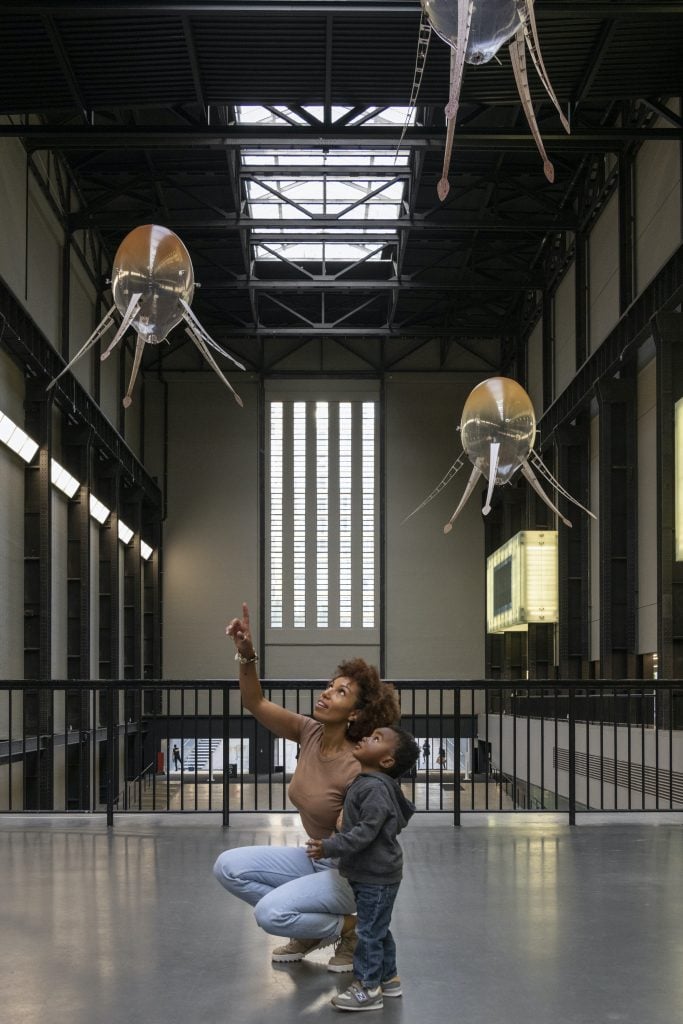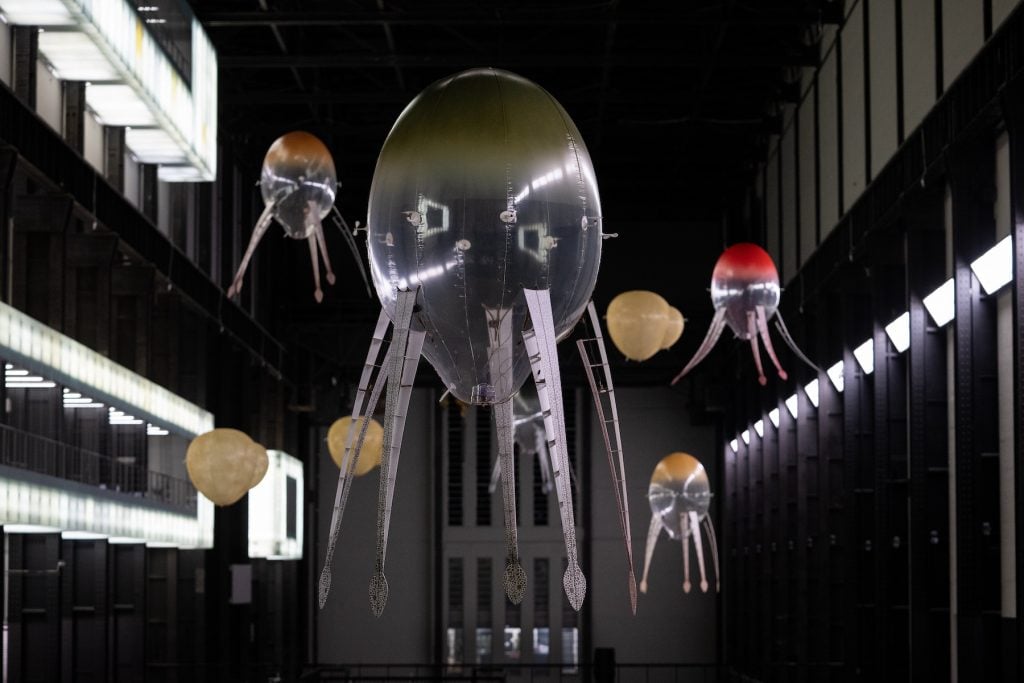On View
‘You Have to Experience It in the Radical Present’: How Anicka Yi’s Ultra-Sensorial Tate Commission Resists the Age of Instagram Art
The artist's Turbine Hall commission involves a lot of smells.

The artist's Turbine Hall commission involves a lot of smells.

Naomi Rea

In the aftermath of Kara Walker’s monumental fountain, Carsten Holler’s playground of slides, and Olafur Eliasson’s unforgettable indoor weather project, I had certain expectations for Tate Modern’s latest Turbine Hall commission, which opened yesterday. But the U.S. artist Anicka Yi, who has been tapped for the annual project, has a more subtle flavor than her noisier predecessors.
A squeal of delight in the audience directed my attention upwards to the bridge across the cavernous room where a fleet of jellyfish-like balloons floated close to the ceiling. For her installation, Yi has invented these hybrid biological and technological creatures called aerobes, which are classified either as “xeno-jellies” whose forms have been inspired by ocean lifeforms or “planulae,” from different types of mushrooms.
Filled with helium and propelled around the room by rotors, they look like they come from an alien planet but are more benign than H.G. Wells’s tripod creatures. As I drew closer, I realized that they were emitting a faintly pleasant aroma; one floated above me and performed a gentle twirl.

Installation view of Hyundai Commission Anicka Yi at Tate Modern, October 2021. Photo by Will Burrard Lucas.
The installation is rooted in the artist’s ongoing interest in shifting the relationship between technology, humans, and the biological world. It proposes a different kind of ecosystem: Her floating creatures imagine new ways that machines could inhabit the world alongside humans, rather than the traditional understanding that they function to serve humans, or work against us in some dystopian capacity.
“I wanted to open up that dialectic and expand the conversation;” Yi said in a press conference at the unveiling of the work. “Machines don’t necessarily have to serve us or scare us in order to coexist with us.”
Taking this idea as her starting point, Yi explained how she started to think about the concept of “wilding” machines; eliminating their functionality, and asking what it would look like to live with them then. Inspired by how organisms learn through their bodies and senses, as well as technological advances within the field of soft robotics, Yi endowed the aerobes with a sort of sensory intelligence. They respond to information, including the scents of the building, sources of heat, and an awareness of their place in space relative to each other.
Once raised in the air, they are completely autonomous, driven by this artificial life program—a software that can be likened to the mind—that simulates and seeks to understand complex biological behaviors. Their unpredictable movements imbue them with a sense of life; the squeal of delight I had heard was a child reacting to them as animals and not machines.

Anicka Yi, “In Love With the World,” Hyundai Commission, Tate Modern. Photo by Joe Humphrys, courtesy Tate.
The sensorial element to the installation also resists the ability to be captured on Instagram. It has an evolving scentscape that you have to physically take into your body to experience, part of a genre that Yi called “metabolic” art.
“You have to experience it in the radical present, in your body and mind as one,” she said. The changing odors emitted around the aerobes have been inspired by different eras of the surrounding Bankside area, from marine scents related to pre-human era to the spices thought to ward off the black death in the 14th century to smells from London’s industrial age.
The scents are subtle and offer up no clear illustrative associations. When I was there, there was was a faintly spicy, not unpleasant, smell of patchouli. When asked what was intended to evoke, Yi informed us wryly that the inspiration was cholera. It’s intentionally a surprise as Yi aims to expand our relationship to smell. We expect to instantly recognize something and categorize it as good or bad, but these confusing scents are not straightforward; they ask you to heighten your awareness, and breathe deeply.
“Yi has worked with smell and scent for a long time, and partly in terms of questioning the primacy of the visual, and the visual as principally male, rational, industrial, technocratic, and Western,” the exhibition’s co-curator Achim Borchardt-Hume told Artnet News. “Whereas our experience of the world encompasses all the senses.”

Installation view of Hyundai Commission “Anicka Yi: In Love With the World” at Tate Modern, October 2021. Photo by Will Burrard Lucas.
The artist is also interested in the politics of air, in how scent can alter your perception of space, and make you aware of the air around you in ways that you weren’t before. Indeed, as I experience the same awareness of the odors and gasses in a room, and the potential risks they carry, I was instantly more aware that I was sharing the air with others.
“Engaging with the air, especially in the age of Covid, it’s an especially rich material to unpack,” Yi said. She wanted to foreground the olfactive questions with the pandemic and to really underscore the air that we’re sharing. Indeed, questions of how how we inhabit the world, climate emergency, and coexistence between humans and other species, have taken on a whole new importance over the past two years. Many people who got sick actually lost their sense of smell; I was one of them, and I don’t think I ever fully appreciated how crucial it was to my experience of the world—from determining if something was burning to recalling past experiences—until I lost it.
“Air is this charged site for social discourse, and with the pandemic and climate crisis it is this substrate that ties us all in this very symbiotic coexistence that we cannot escape,” she said. “We are all these vessels of interdependence and we have a responsibility toward each other.”
And that’s what the Turbine Hall commission has always done: brought people together. The show places Yi in dialogue with the works before her, such as Superflex’s three-man swings that required people to work together to enjoy them. So, too, does her work underscore how we—as either biological or technological entities—are all in this together.
“Anicka Yi: In Love With the World” is on view at Tate Modern through January 16.